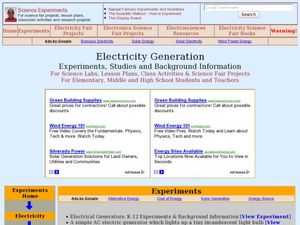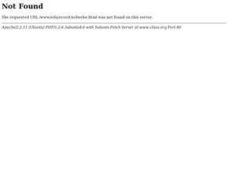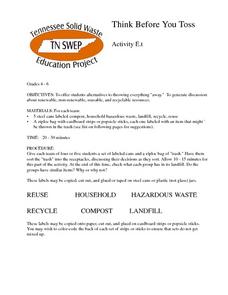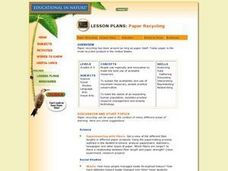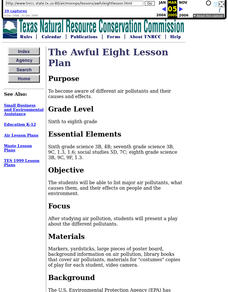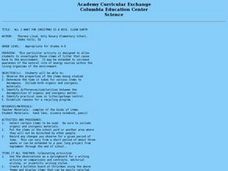Curated OER
Analogies
In this analogies worksheet, students complete the analogies about fuel, carbon dioxide, decay, and more. Students complete 10 analogies.
Texas State Energy Conservation Office
Unit 2 - Section 2 - Fuels for Everything
In this alternative energy worksheet, 6th graders read and study the varying types of fuel. Students read examples and ways that alternative fuel can be used.
Curated OER
Landslides
Young scholars study a natural disaster. In this landslides facts lesson, students discover how and why landslides happen and how they have an effect on people. They discuss this information as a class and then work in small groups to...
Curated OER
Recycling Activities
Students explain the importance of recycling. In this environmental science lesson plan, students classify materials as recyclable or not. They make posters that promote the benefits of recycling.
Curated OER
Electricity Generation
Students study the history of electricity and the different ways we generate electricity. In this electricity lesson students complete several experiments on generating power.
Curated OER
Compost Columns
In this unit of lessons, students examine the role of compost columns and recycling. They create a KWL chart about garbage in Chicago. They also examine life cycles and packaging of everyday products.
Curated OER
Think Green
Students experience and practice compositing and recycling through hands-on-activities. They distinguish between which items from their trash can be recycled, composted and reused. The process for making recycled paper is also covered in...
Curated OER
Think Before You Toss
Students sort a variety of trash items and determine thier sorting decisions.
Curated OER
Soild Waste and Recycling
In this unit of lessons, students examine solid waste and recycling. They discover the concept of decomposition. They also observe the decomposition process and make observatins.
Curated OER
PAPER RECYCLING
Students examine the availability and use of important resources, people practice conservation. They explore the needs of an expanding human population, societies practice resource management and employ technology.
Curated OER
Stage 1: Get the Message Out, Create a Radio Commerical
Student create a radio commerical. They think of ways they want to communicate to people about waste. Student find a fun and creative way to reinforce the challenge of waste. They work in small groups to create a radio commerical that...
Curated OER
Environment: Methane Sources
Students discover how human activity is increasing the release of methane gas into the atmosphere. Woring in groups, they visit the Eduzone Website and complete worksheets. Students identify the natural and human causes of methane gas.
Curated OER
Recycling
Students discuss the pros and cons of recycling on the environment. They sort and classify objects for recycling and write a brief narrative about the experience. This lesson is intended for students acquiring English.
Curated OER
Cows, Worms, and Compost
Students study decomposition. In this decomposition lesson, students discuss the background information about decomposition. Students then complete the 'Chew It Twice' worksheet.
Curated OER
Household Hazardous Waste Identification
Fourth graders learn about reduce, reuse, and recycle and identify household hazardous products. Students learn about less hazardous alternatives and complete an inventory of hazardous materials in a typical household.
Curated OER
Designing a Tropical Reserve System
Students explain the complexity of resource, land use, and conservation decisions.
Curated OER
The Awful Eight Lesson Plan
The middle schoolers list major air pollutants, what causes them, and their effects on people and the environment. Students list ways they can prevent or reduce the types of air pollution mentioned in the play.
Curated OER
Rubber Gardens
Students recycle discarded automobile tires and create gardening sites for limited space areas.
Curated OER
All I Want for Christmas is a Nice, Clean Earth
Students observe properties of items, determine time it takes for organic/inorganic items to decompose, identify differences/similarities between decomposition, identify practical uses in litter/garbage control, & establish reasons...
Curated OER
Toxics Lesson Plan
Students discover that chemicals and toxics are all around us and we can make a choice whether or not to use them.
Curated OER
Sludge
Students become familiar with the idea that sludge is a waste product but can also be a resource, depending on its characteristics and how we manage it. They read information and answers questions on a worksheet imbedded in this plan.
Curated OER
Recycled Water?
Young scholars participate in a hands-on activity to investigate how water is recycled in a small environment, and determine how water is cycled on earth.
Curated OER
Recycling and Waste Management Debate
Students research issues about how a community should manage its garbage. Students present and debate solid waste management strategies by presenting multiple sides of the issue.
Curated OER
Invention
Students create an invention, or simple machine, out of items taken from the recycling bin. Students draw diagrams of their proposed inventions, then create simple machines.
Other popular searches
- Landfills Maths
- Items Found in Landfills
- Landfills Rubric
- Methane and Landfills
- Sanitary Landfill
- Landfills United States
- Landfills Worksheets
- Landfills + Maths
- Landfills 9 12
- Hazardous Waste Landfill
- Environment Landfill
- Model Landfill






